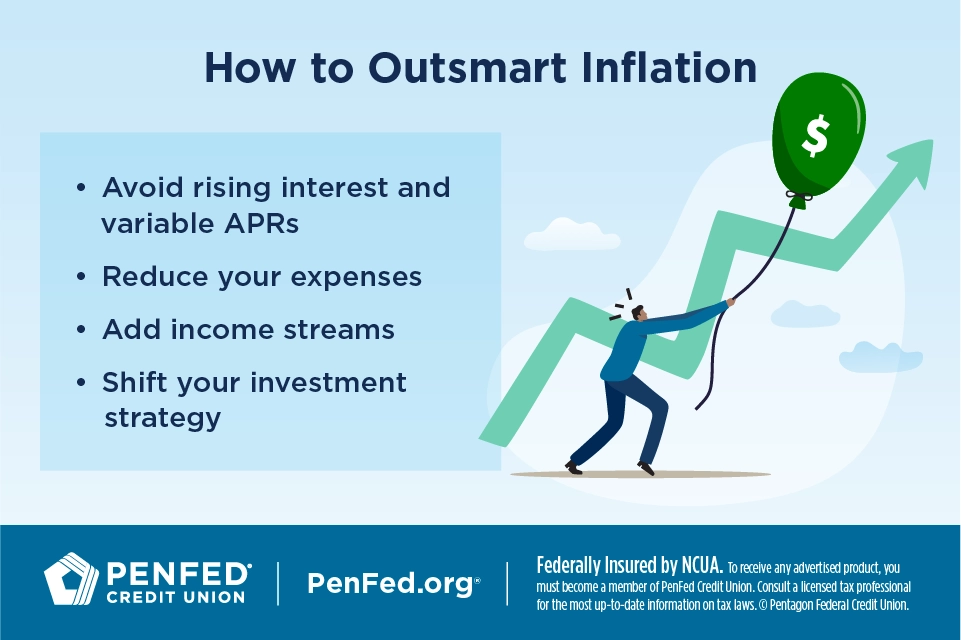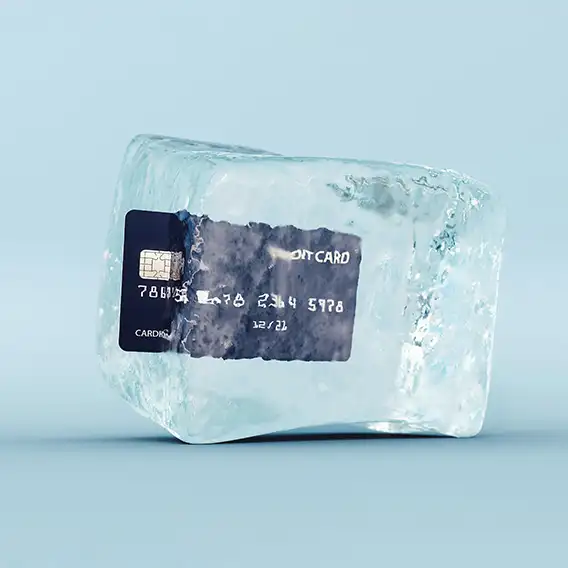Finance
What Is Inflation?
EXPECTED READ TIME:6 minutes
Imagine yourself in your favorite grocery store. You pick up the same brands you normally do, but the total at checkout surprises you. Then the same thing happens when you stop for gas on the way home. Even utility bills have you scratching your head — did heat cost this much last year?
If it suddenly feels like everything costs more, the answer could be inflation.

What Is Inflation, in Simple Terms?
Inflation is a broad increase in prices across a range of goods and services in different areas of the economy. It’s not just a temporary increase in one specific area. This broad increase expressed as a percentage called the inflation rate.
In general, many factors can affect the price of a product. For instance:
- Weather patterns or agricultural diseases can create shortages of a type of produce or meat
- Increased travel in summer can lead to more demand for gas and higher prices at the pump
- Sudden popularity can create a short-term bidding war for a must-have item
But in these cases, the price increase is temporary and only affects a few goods in the market. Inflation, on the other hand, has a more widespread impact on prices.
And while periods of inflation can pass and prices will get lower, they usually don’t completely return to their pre-inflation levels.
What Causes Inflation?
Inflation happens when the amount of money a nation has in circulation grows faster than the nation’s economy.
Inflation happens when the amount of money a nation has in circulation grows faster than the nation’s economy. There are many reasons why this might happen, including:
Government Intervention
Sometimes a country’s monetary authority takes actions to control the economy that can lead to inflation.
Higher Cost of Production
Higher wages or increases in benefits (think retirement contributions or health insurance) can raise the cost of labor over time.
Supply shocks like natural disasters, war, or pandemics can create raw material shortages in multiple sectors of an economy. Shortages can lead to higher expenses for manufacturers.
Decline in Productivity
Lack of demand, labor shortages, loss of government incentives (like tax breaks), or supply shortages can lead to a decline in productivity. When there aren’t enough products to meet demand, this can cause inflation.
Types of Inflation
Regardless of how it happens, inflation causes money to lose purchasing power. The two main types of inflation involved in this phenomenon are demand-pull inflation and cost-push inflation.
Regardless of how it happens, inflation causes money to lose purchasing power.
Demand-Pull Inflation vs. Cost-Push Inflation
Demand-pull inflation happens when consumers want more products or services than their economy can provide. Cost-push inflation happens when the cost of production increases.
What Is Built-In Inflation?
Built-in inflation isn’t a type of inflation as much as a factor in cycles of inflation. When prices increase and remain high, workers may ask their employers for higher wages to offset their cost-of-living increases. While higher wages may help workers, they can also increase production costs, leading to cost-push inflation.
While higher wages may help workers, they can also increase production costs, leading to cost-push inflation.
Notable Periods of Inflation
Experts use the consumer price index (CPI) to compare inflation rates from different periods of time. The Bureau of Labor Statistics (BLS) gathers data monthly from across the country to determine average prices for common household goods and services that are used to calculate the CPI.
The Federal Reserve then uses the CPI (along with other tools) to decide on economic policies for our economy.
The CPI was introduced in 1913, and since then the highest annual inflation rate recorded was 17.8% in 1917. The longest lasting period of inflation was from 1973-1982. Economists generally agree that there have been seven major periods since World War II in which the inflation rate, as measured by the CPI, was above 5%: 1946-1948, 1950-1951, 1969-1971, 1973-1982, 2008, and 2021-2022.
Inflation can lead to a financial crunch if wages don’t keep pace with prices.
Is Inflation Good or Bad?
Like beauty, the effect of inflation is in the eye of the beholder. The value of assets like your house or stocks will likely increase during periods of inflation, leading to bigger profits if you sell.
For that reason, monetary authorities try to maintain just the right amount of inflation so that people will spend money and keep the economy growing.
However, if you’re trying to buy assets, then inflation means you’ll have to pay more to buy the same product or service — which may lose value once inflation resolves. When the inflation rate fluctuates a lot, it can discourage buyers and slow economic growth.
Also, inflation tends to increase the general price of products and services over time. That can lead to a financial crunch if wages don’t keep pace with prices.
You can’t really change the sticker price on mangoes right now, but, if you think outside the box, you could find yourself thriving.
Strategies for Beating Inflation
You can’t really change the sticker price on mangoes right now, but if you think outside the box and adjust your lifestyle a bit, you could find yourself thriving instead of just surviving inflation.
Avoid Rising Interest and Variable APRs
Inflation often translates to higher interest rates. You’ll be better prepared for inflation if you keep your credit utilization low, stick to credit cards with competitive interest rates, and pay off your balance monthly to avoid interest charges.
Debt Consolidation
If you’re carrying high-interest debt — or if your debt load has been growing — consider consolidating your debt with a fixed-rate personal loan or developing a strategy to pay off credit card debt in double time.
These options can all help you avoid interest rate hikes. On top of that, debt consolidation eases your stress levels and saves you precious time by simplifying your monthly payments.
Debt consolidation eases your stress levels and saves you precious time.
Reduce Your Expenses
From changing your grocery strategy to finding new ways to entertain yourself, getting the most for your money during an inflation period means adapting to a new way of life. If that sounds scary, we have some tips to help you get started.
1. Review Your Budget and Find Places to Trim Unnecessary Expenses
You might be able to save on entertainment or cancel unused subscriptions. Instead of nights on the couch scrolling through streaming services, consider free (or cost optional) entertainment like getting out to an open mic or going to a meetup.
Identify and Correct Your Spending Habits
Food has become particularly expensive during recent inflation hikes. Consider shopping locally, maybe at a farmer’s market, or buy wholesale to reduce your grocery bill.
If you’re a diehard when it comes to organic, consider alternating grocery trips, with one week organic, one week not, and buying “low-tox” conventional items during the latter.
Meal planning and eating at home can help you save a lot, too. Buy in bulk, double recipes (consider a meal-planning app), and make some freezer space.
Meal planning and eating at home can help you save a lot.
Take Advantage of Opportunities to Save
Use coupons, score BOGO deals, and don’t forget about savings that may be available through loyalty programs at your favorite stores or restaurants. If you must get coffee at a shop, grab a punch card. And, of course, take advantage of credit card cashback and rewards points.
Add Income Streams
Income from a side hustle can offset soaring prices. If you don’t have lots of time to invest in a second job, consider setting up a passive income stream. Or consider picking up freelance work or odd jobs around town.
Income from a side hustle can offset soaring prices.
Shift Your Investment Strategy
Some investments don’t keep up with inflation as well as others. You may do better investing in tools like Treasury Inflation Protected Securities (TIPS) or I-bonds that offer lower overall returns but protect your purchasing power.
Keep your assets liquid by opting for short-term certificates (or certificate laddering), high-yield savings accounts, and money market accounts so you can invest in better opportunities as you find them.
Inflation can be a frustrating economic force, but you’re not powerless against it.
The Takeaway
Inflation can be a frustrating economic force, but you’re not powerless against it. Practicing good financial wellness, keeping an updated budget, and managing your debt load are just the start of many ways you can push back against rising prices.
Find Your Perfect Savings Account
Discover the diverse offering of products, services, and support available to our members.




